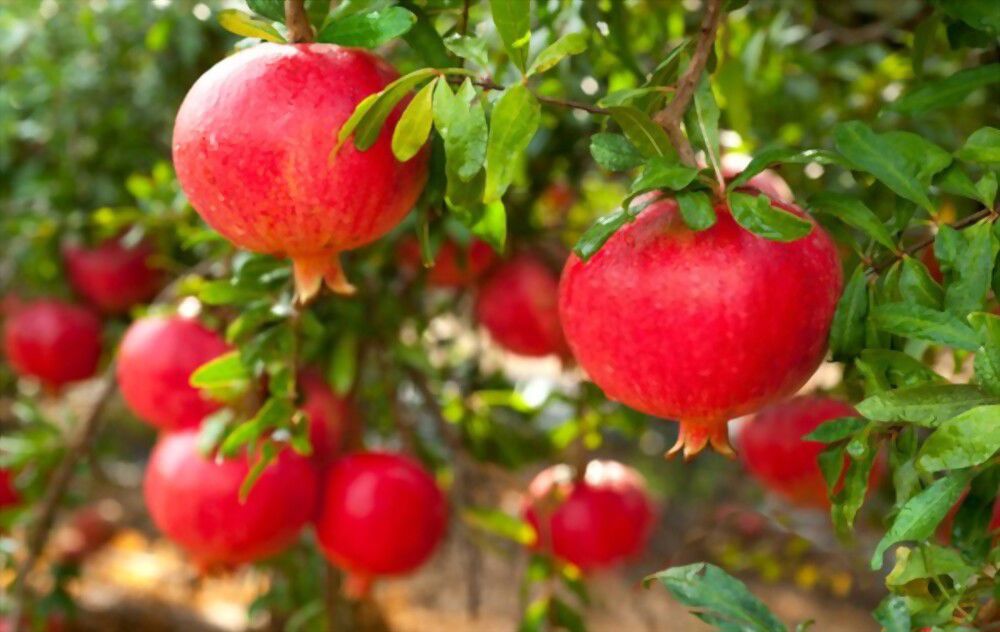One of the most interesting fruits in the Bible may be the pomegranate. Pomegranates have been around for centuries and have been used in various ways. But what many people don't know is that they hold spiritual meaning as well. The pomegranate has been a spiritual symbol for centuries, representing fertility, abundance, and prosperity in many cultures from around the world. Read on to find out more about the spiritual meaning of pomegranates.
1. The symbolic meaning of the pomegranate in Islam.
1.1. Pomegranate Symbolism Islam
The pomegranate is a fruit with strong spiritual significance in Islam. It is believed to be a symbol of abundance and fertility, as the many seeds it contains signify plentitude and multiplicity. This symbolism of abundance extends further to represent divine benevolence, generosity, justice, and mercy. In Islamic culture, the pomegranate is also associated with charity and altruism as it is seen as an offering from God that helps to ensure physical sustenance for mankind.
In addition to representing abundance, the pomegranate is also a symbol of resurrection in Islam due to its similarity to the human heart. Its round shape signifies eternity while its red skin symbolizes sacrifice; thus the pomegranate serves as a reminder of life after death and spiritual rebirth.
The pomegranate is seen as a symbol of divine wisdom in Islam due to its numerous seeds. The Quran often mentions the pomegranate as an example of God's power, stating that no other fruit can contain such an abundance of seeds within its skin.
1.2. What does Quran say about pomegranate?
The Quran makes numerous references to the pomegranate and its spiritual significance. Most notably, it is mentioned in the following verse from Surah Al-Insan: “And the pomegranate; that We may cause it to be a sign for those who believe” (76:25).
This verse serves as an encouragement to believers; it suggests that just like the pomegranate which contains seeds of different colors and shapes, faith should also encompass variety and diversity. It also signifies fertility, renewal, and rejuvenation. According to Islamic tradition, the flower at the center of a pomegranate symbolizes truthfulness while its many seeds are symbolic of embracing multiple paths while still remaining united in pursuit of fidelity to one’s faith.
The Quran also features another verse in which the pomegranate is used to illustrate something impossible: “Do you not see how Allah has created seven heavens in layers and placed the moon as a light therein, and made the sun as a lamp? And Allah has caused you to grow from the earth a green plant, then He makes it dry stubble - you will surely see variations thereof - and He causes rain to descend from heaven; then He produces with it fruits of diverse colors; most surely there is a sign in this for a people who reflect” (39:6-7). Here, we can understand that just as it is impossible to find two pomegranates identical in shape, color, and size, it is also impossible to find two people alike. This emphasizes the importance of accepting different opinions and embracing diversity.
It is clear that Islam has a great appreciation for the pomegranate as a symbol of faith, renewal, fertility, and diversity. It is no wonder why many Muslims have adopted this powerful fruit as part of their spiritual practice. From hanging decorations in homes during Ramadan to adorning graves with the fruits for mourning rituals - pomegranates are often seen as a sign of divine grace and protection from evil forces. Through this symbolic meaning, the pomegranate continues to be revered in Muslim culture.
2. Spiritual meaning of pomegranate in the Bible
2.1. The pomegranate is a symbol of the resurrection and eternal life
In Christianity, the red fruit has been seen as symbolic of Christ's death on the cross due to its resemblance to drops of blood. The abundant number of seeds within the pomegranate is thought to represent eternal life and resurrection. Additionally, it may be seen as a reminder for believers to stay focused on the divine mission and not get sidetracked by earthly desires.
The Bible mentions pomegranates numerous times and uses them as a symbol of fertility, abundance, and life. In the Old Testament, the pomegranate is seen as a representation of God's covenant with Israel. The abundance of seeds in this fruit is said to signify fullness of knowledge and wisdom while also being a reminder of God's great generosity.
The pomegranate also symbolizes the resurrection of Jesus, as it contains many seeds within its hard outer shell. The many seeds in each fruit represent Jesus’ disciples and remind us that we can always find a way to stay connected with God.
The combination of life and death in the fruit is seen to represent the death and rebirth experienced by Christ after his crucifixion. It serves as a reminder that even through suffering there can be renewal, hope, and new beginnings.
2.2. The pomegranate symbolizes faith and hope, as well as abundance and fertility
In Christianity, the pomegranate has a spiritual meaning that is deeply rooted in biblical history. It symbolizes faith and hope, as well as abundance and fertility. In the Bible, references to the pomegranate are often used to represent prosperity and divine blessing. The pomegranate is also a sign of abundance, as it has been known to produce an abundant harvest.
The symbolism of the pomegranate in Christianity speaks deeply to our faith. It reminds us of God’s presence with us at all times, encourages us to persevere through difficult times, and helps remind us of the hope of resurrection and new life after suffering. The pomegranate is a powerful symbol that can be seen in many Christian art pieces, religious ceremonies, and prayer rituals as an expression of faith and hope.
3. The spiritual meaning of the pomegranate in Buddhism
In Buddhism, the pomegranate is seen as a symbol of enlightenment, abundance, and growth. For Buddhists, the pomegranate embodies the teachings of the Buddha and his path toward wisdom and understanding.
In Buddhist iconography, the pomegranate is sometimes used in place of an entire fruit bowl or basket held by some figures such as Kuan Yin, a Bodhisattva often depicted with a symbolic offering and holding a vase containing lotuses and other flowers. This symbolizes her vow to help those in need. The number of seeds contained inside the pomegranate is said to be equal to the number of blessings bestowed upon all living creatures when she accepts their offerings.
In the Buddhist tradition, the story of Hariti, a demoness who feasted on children, is a testament to the power of Buddhism to transform evil into good. It is said that it was the Buddha himself who cured her of her wicked ways by offering her a pomegranate to eat. The pomegranate has thus come to symbolize both the power of Buddhism and fertility due to its plentiful seeds. This fruit has been seen as a talisman of hope and prosperity since ancient times. Through its symbolism, it serves as an enduring reminder of how good can triumph over evil in any circumstance.
In Tibetan Buddhism, the seeds of a pomegranate represent the potential for enlightenment that exists within all beings — that despite life’s challenges, we can still awaken our true nature if we search deeply within ourselves.
Pomegranates are often used in Buddhist ceremonies and rituals as offerings or decorations. They can also be seen adorning shrines, temples, and other places of worship as symbols of good luck and prosperity. The pomegranate has also become associated with compassion due to its many seeds representing the idea that even small acts of kindness can make a big difference in people’s lives.
The pomegranate has long been a source of inspiration for artisans throughout Asia. From intricate carvings on temple walls to delicate paintings on scrolls, the pomegranate is a timeless symbol of luck and abundance that has been celebrated for centuries.
Buddhists in particular have used the pomegranate to represent the beauty and fragility of life, reminding us to be mindful of our actions and appreciate all that we have.
4. What is the significance of pomegranates to Jews?
In Jewish tradition, the pomegranate is often given as a gift or presented at religious ceremonies to represent blessings for those involved including health, success, children, and wealth.
Pomegranates are highly symbolic to Jews, representing abundance and prosperity. The pomegranate fruit is said to have 613 seeds, which symbolizes the 613 mitzvot (commandments) of the Torah. In Judaism, the pomegranate is thought to represent righteousness and good deeds as it has a hard outer shell with many chambers inside containing sweet juice. This represents how on the outside one may appear righteous but in reality, there are many unknown good works done inside.
In addition to this symbolism, there is also an ancient legend that states that when Sarah passed away she had as many tears as there were seeds of a pomegranate. Thus, a common Jewish tradition involves eating at least one pomegranate at the beginning of Rosh Hashanah as a sign of mourning and remembrance.
Moreover, pomegranates are also seen as a symbol of fertility in Judaism. This is due to the fact that they have many seeds, representing abundance and blessings for generations to come. It is not uncommon during Jewish weddings for grooms to break open a pomegranate while wearing the traditional wedding canopy (Huppah), thus symbolizing prosperity and bountiful offspring.
Overall, pomegranates carry deep spiritual meaning in Jewish culture. They represent righteousness, good deeds, abundance and prosperity, fertility, and even remembrance. Thus it is no wonder why this fruit continues to be an important part of Jewish culture today.
5. The Symbolism of the Pomegranate in Greek Mythology
In Greek mythology, the Pomegranate symbolizes many things, but most notably it is associated with the goddess Persephone. It is believed to have been associated with Persephone, the goddess of springtime, rebirth, and vegetation.
According to the myth, when Persephone was kidnapped by Hades and taken to the Underworld, he tricked her into eating several pomegranate seeds. When she did so, it meant that she had to stay in the Underworld for part of every year. This myth explains why there are seasons on earth—when Persephone returns to the earth each spring after spending six months in the underworld, plants begin to blossom, and new life sprouts forth.
The Pomegranate has come to symbolize fertility and resurrection since then; while its strong outer shell protects a sweet inner core of juice and fruit-bearing seeds, it also serves as a reminder of Persephone's abduction and her journey back to the light. This symbol is often found in Greek art, including mosaics and sculptures from Ancient Greece. It is said that if one looks at a mosaic or painting of Persephone, she will be holding a pomegranate in her hand. As such, many people now consider the Pomegranate to be a protective symbol for women everywhere.
The pomegranate was also often used as a decoration during weddings due its connection to marriage and fertility. Additionally, it has become a popular motif in ancient Greek artwork – from jewelry designs to pottery decorations – because it stands for prosperity and generosity. Many people use it to decorate their homes around the holidays as a reminder of Persephone's journey, one that transcends the boundaries between life and death.
Conclusion
The pomegranate has been a spiritual symbol for centuries, representing fertility, abundance, and prosperity in many cultures from around the world. In Christianity, the fruit is seen as a representation of eternal life and the resurrection of Jesus Christ due to its many seeds. Judaism uses the pomegranate to symbolize righteousness and justice as it contains 613 seeds, which represent the 613 commandments in the Torah. It also carries connotations of protection from evil forces when used as an amulet or carried with one. Finally, this symbolic fruit has become popular in art, literature, and jewelry thanks to its unique shape and vibrant colors that bring life to any space.
So next time you see a pomegranate, take a moment to appreciate its spiritual meaning and all the good it can bring into your life.









